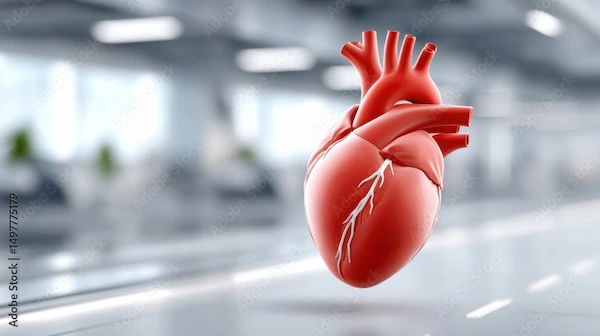Coronary Heart Disease: Effects on the Body, Symptoms, and Management
Understand coronary heart disease and its effects on the body, including its impact on the heart, blood vessels, and overall health. Learn about symptoms, complications, and management strategies.

Written by Dr Sonia Bhatt
Last updated on 3rd Jul, 2025
Coronary heart disease occurs when the narrowing or blockage of coronary arteries leads to a decrease in the supply of blood to the heart. The effect of less blood supply reduces the functionality of the heart and causes severities. Coronary heart disease remains one of the leading causes of death across the globe and underlines its importance as a global health issue.
The disease appears to be often related to lifestyle practices, including poor diet, smoking, physical inactivity, diabetes, and high blood pressure.
Pathophysiology of CHD
The coronary arteries play a critical role in transporting oxygen-rich blood to the heart muscle for proper activity. If these arteries are blocked or narrowed, the heart will have difficulty establishing the metabolic demands of the body.
Development of Atherosclerosis: Over time, fatty deposits (plaque) accumulate on the artery walls in a process called atherosclerosis.
Plaque Formation: This plaque narrows the arteries, making it harder for blood to flow. In some cases, plaque can rupture, leading to blood clots that block the arteries entirely, causing a heart attack.
These changes disrupt the balance between the heart's oxygen supply and demand, resulting in symptoms like angina (chest pain) or more severe complications.
Cardiovascular Effects
Coronary heart disease significantly affects the heart's structure and function, leading to various complications. The most straightforward complication that arises is with the heart.
The heart has to work harder to pump blood through narrowed arteries, leading to increased strain. Over time, this can weaken the heart muscle. When a coronary artery is completely blocked, the heart muscle is deprived of oxygen, resulting in a heart attack. This can cause permanent damage to the heart tissue.
Additionally, chronic CHD may lead to heart failure, where the heart cannot pump blood effectively to meet the body's needs. Symptoms include breathlessness, fatigue, and fluid retention
Consult Top Doctors For Coronary Heart Disease
Systemic Effects
Coronary heart disease (CHD) extends its impact beyond the heart, affecting the entire vascular system and overall blood circulation. For instance, CHD contributes to hypertension (high blood pressure) as the narrowed arteries increase resistance to blood flow. Over time, this added strain damages blood vessels, making them less elastic and more prone to further plaque buildup. Poor vascular health also reduces the body’s ability to regulate blood pressure effectively, increasing the risk of organ damage in the long run.
Further, atherosclerosis not only narrows arteries but also creates an unstable environment where plaques can rupture. When this occurs, blood clots can form, obstructing blood flow to critical areas.
In addition to heart attacks, these clots may travel to the brain, significantly increasing the risk of ischemic strokes. The clotting process is an ongoing threat in individuals with CHD and underscores the importance of preventive measures like antiplatelet therapy.
Respiratory System Impacts
CHD can also compromise the respiratory system due to its direct impact on blood circulation and oxygen delivery. When coronary arteries are narrowed, the heart’s ability to pump oxygen-rich blood is diminished. This not only affects the heart but also reduces the oxygen available to other organs, including the lungs. Over time, the mismatch between oxygen supply and demand can impair respiratory efficiency.
Individuals with CHD often experience shortness of breath (dyspnea), particularly during exertion. In advanced cases, even minor physical activity or lying flat can trigger breathing difficulties.
These symptoms are exacerbated in conditions like pulmonary oedema, where fluid buildup in the lungs results from poor heart function.
Neurological Effects
The impacts of CHD extend to the brain and neurological health, reflecting the interconnections of the body’s systems. Chronic CHD can reduce blood flow to the brain, depriving it of essential oxygen and nutrients. Over time, this may contribute to cognitive decline, memory problems, and difficulties with concentration. Research increasingly links cardiovascular health to brain health, with poor heart function identified as a potential risk factor for dementia, including Alzheimer’s disease.
CHD significantly increases the likelihood of stroke, either through the formation of blood clots or through reduced blood flow caused by severely narrowed arteries. A stroke can lead to temporary or permanent neurological damage, depending on its severity and location in the brain.
Symptoms such as paralysis, speech difficulties, and loss of motor skills often accompany strokes, highlighting the critical need for prompt medical attention.
Musculoskeletal and Physical Activity
Coronary heart disease (CHD) can significantly impact physical performance and overall musculoskeletal health.
Reduced blood flow caused by CHD limits the heart’s ability to pump sufficient oxygen-rich blood during physical activity. This leads to decreased stamina and lower exercise tolerance, even for moderate activities. Many individuals experience difficulty in maintaining their usual levels of physical fitness, which further exacerbates cardiovascular risk.
Poor circulation affects not just the heart but the muscles throughout the body. Inadequate oxygen and nutrient delivery to muscles results in fatigue and generalised weakness, making everyday tasks feel more strenuous.
This cycle of reduced activity can contribute to muscle loss over time, compounding the physical limitations caused by CHD.
Digestive System Consequences
While CHD primarily affects the cardiovascular system, its indirect impact on the digestive system is notable. Reduced blood flow may compromise the functioning of the digestive organs, such as the stomach and intestines. This can lead to slower digestion and less efficient absorption of nutrients, further affecting overall health and energy levels.
Individuals with CHD often require dietary adjustments to manage cholesterol, blood pressure, and weight. Hence, a heart-healthy diet that includes nutrient-dense foods while avoiding processed foods and excessive fats is crucial. These dietary modifications ensure adequate nutrient intake while reducing the strain on the cardiovascular system.
Psychosocial Impacts
CHD doesn't just affect the body, but it also has a severe impact on the mental health and emotional well-being of the patient.
Living with CHD brings anxiety, fear, and, at times, even depression to the individual. Learning to cope with the burden of treatment and working with healthcare providers regarding various aspects of care can be overwhelming for any individual. In addition, concerns about physical limitations and potential complications often add to the mental strain, taking a significant toll on overall well-being. Psychological stress itself can worsen CHD by raising blood pressure and promoting unhealthy coping mechanisms such as overeating or smoking.
Addressing the psychosocial impacts of CHD requires a multi-faceted approach. Support groups, counselling, and stress management techniques such as mindfulness or yoga facilitate coping. Whereas, regular counselling sessions with authorised mental health professionals can further offer assistance to deal with associated mental distress.
Prevention and Management Strategies
For the first line of prevention, certain lifestyle changes can be incorporated into the routine. These include:
Quitting smoking
Following a balanced diet
Doing regular physical chores
Managing stress
Monitoring and controlling blood pressure, cholesterol, and blood sugar level
Conclusion
Fortunately, developments in research have improved the entire scope of CHD management. Interventions such as statins for lowering cholesterol, antiplatelet medication for the prevention of clot formation, and surgical interventions, including angioplasty and bypass surgery, are only some examples. Other emerging innovations, such as minimally invasive procedures and personalised medicine, continue to improve outcomes for patients with hope for healthier tomorrows.
CHD impacts all aspects of physical, emotional, and social well-being. By acknowledging the multifaceted nature of CHD and adopting comprehensive prevention with effective management strategies, individuals can take proactive steps to enhance heart health and overall quality of life.
Consult Top Cardiologist
Consult Top Doctors For Coronary Heart Disease

Dr. Siddharth Bajaj
Cardiologist
10 Years • MBBS, M.D. D.M. (Cardiology)
Hyderabad
Apollo Hospitals Jubilee Hills, Hyderabad
Dr. Diganta Buragohain
Cardiologist
1 Years • "DM (Cardiology) in 2025 from NEIGRIHMS, Shillong MD (General Medicine) in 2020 Gauhati Medical College, MBBS in 2015 from Gauhati Medical College,"
Guwahati
Apollo Excelcare Hospital, Guwahati

Dr. Dayanashre N
General Physician
3 Years • MBBS
Bengaluru
PRESTIGE SHANTHINIKETAN - SOCIETY CLINIC, Bengaluru

Dr. Zulkarnain
General Physician
2 Years • MBBS, PGDM, FFM
Bengaluru
PRESTIGE SHANTHINIKETAN - SOCIETY CLINIC, Bengaluru

Dr. Bhethala Sharan Prakash
General Physician/ Internal Medicine Specialist
5 Years • MBBS MD
Bengaluru
PRESTIGE SHANTHINIKETAN - SOCIETY CLINIC, Bengaluru
Consult Top Cardiologist

Dr. Siddharth Bajaj
Cardiologist
10 Years • MBBS, M.D. D.M. (Cardiology)
Hyderabad
Apollo Hospitals Jubilee Hills, Hyderabad
Dr. Diganta Buragohain
Cardiologist
1 Years • "DM (Cardiology) in 2025 from NEIGRIHMS, Shillong MD (General Medicine) in 2020 Gauhati Medical College, MBBS in 2015 from Gauhati Medical College,"
Guwahati
Apollo Excelcare Hospital, Guwahati

Dr. Dayanashre N
General Physician
3 Years • MBBS
Bengaluru
PRESTIGE SHANTHINIKETAN - SOCIETY CLINIC, Bengaluru

Dr. Zulkarnain
General Physician
2 Years • MBBS, PGDM, FFM
Bengaluru
PRESTIGE SHANTHINIKETAN - SOCIETY CLINIC, Bengaluru

Dr. Bhethala Sharan Prakash
General Physician/ Internal Medicine Specialist
5 Years • MBBS MD
Bengaluru
PRESTIGE SHANTHINIKETAN - SOCIETY CLINIC, Bengaluru

